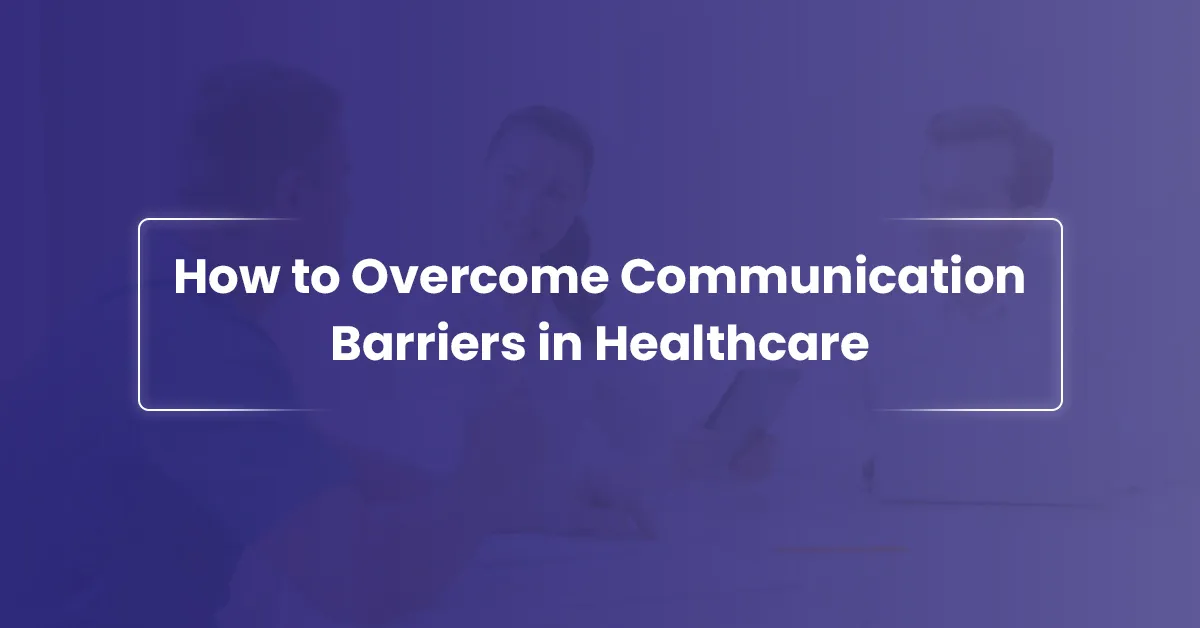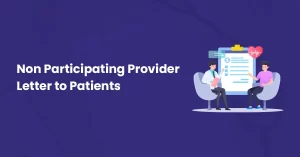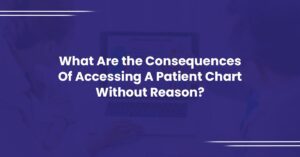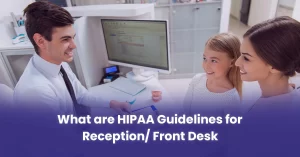Communication refers to exchanging information between two or more people. Effective communication leaves people satisfied, decreasing potential conflicts. And that is particularly crucial in the healthcare sector.
It’s important to clearly communicate not only with patients but also among the hospital staff. Let us understand how to overcome communication barriers in healthcare settings to increase patient safety and the overall efficiency of medical organizations.
But before jumping into the solutions, let us, first, understand the effects and types of healthcare communication barriers.
Effects of Communication Barriers in Healthcare
Poor communication by healthcare professionals can result in severe effects, such as:
- Diagnostic errors
- Improper treatment
- Delayed therapy
- Patient dissatisfaction
- Compromised patient safety
- Inefficient use of resources
- Poor documentation
- Increased wait times
- Medical staff conflicts
- Unnecessary visits
- Improper billing
- Technical problems
- Overall pressure
And the list continues. But providers can prevent these issues by recognizing and addressing systematic and personal communication barriers in healthcare settings.
Types of Communication Barriers in Healthcare
There are many types of communication barriers in healthcare settings:
- Language barrier.
- Cultural diversity.
- Emotional barriers.
- Privacy concerns.
- Physical barriers.
- Limited health literacy.
- Complex medical jargon.
- Technological barriers.
- Medical information overload.
- Grapevine communication.
Again, the list goes on! Barriers to communication in healthcare can be overcome by strategically implementing solutions to each of these barriers.
How to Overcome Communication Barriers in Healthcare?
Overcoming communication barriers in healthcare is quite challenging but not impossible. Let us share 10 powerful ways to prevent any communication problem to achieve the ultimate healthcare excellence.
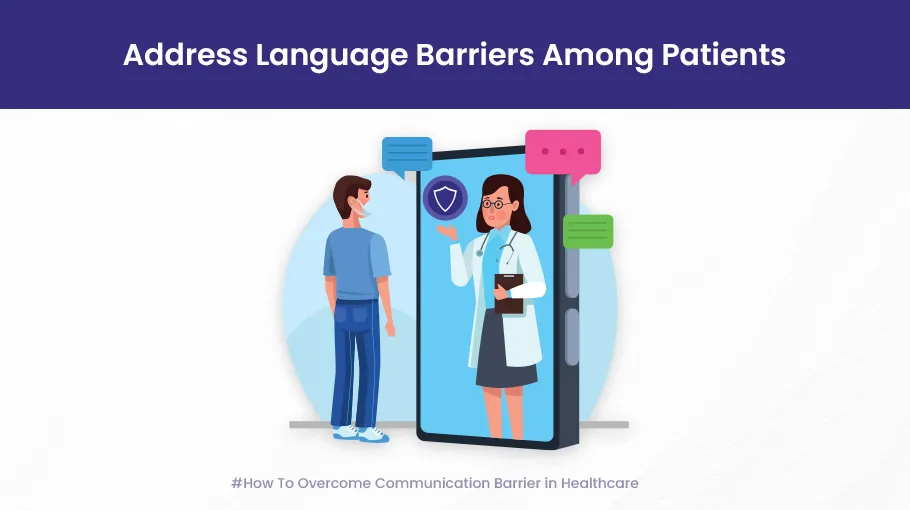
1. Address Language Barriers Among Patients
Language and communication barriers in healthcare settings occur when patients with limited English proficiency struggle to understand medical information, instructions, or health-related conversations. These barriers may result in improper treatment or non-compliance with medical advice.
To address language and communication barriers in healthcare, providers may use professional interpreters and translators, trained in medical terminology. This way, patients will receive accurate and contextually relevant information. The supportive and inclusive environment in healthcare enhances the care quality and patient satisfaction.
Also, healthcare facilities can provide translated written materials and use multilingual chatbots to bridge communication gaps. They should also assess and document each patient’s language needs at the beginning of their care. Offer these services free of charge, as mandated by the Civil Rights Act, to ensure equal access to healthcare services for all patients.
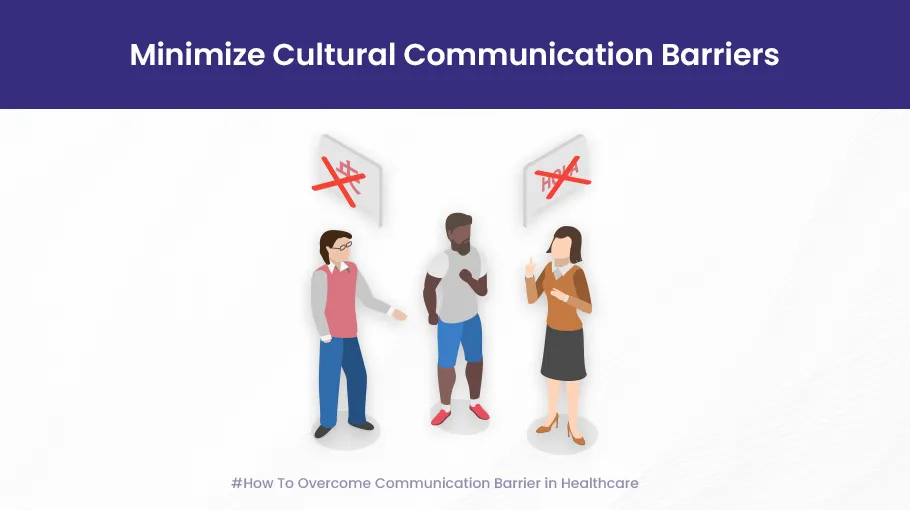
2. Minimize Cultural Communication Barriers
Culture is more than just ethnic or national identity. It includes all social factors that influence how individuals perceive and engage with the world. Cultural communication barriers in healthcare often stem from cultural beliefs, customs, and interactions.
In healthcare settings, providers may encounter patients from various cultural backgrounds. Misunderstandings can arise when healthcare providers overlook the cultural nuances of immigrant or minority groups. So sometimes, people express mistrust in medical facilities.
Cultural differences in health beliefs and religious practices can conflict with standard medical practices. For example, some patients may have health beliefs that do not align with the biomedical model, or religious customs that restrict certain medical procedures.
Acknowledge their emotional responses towards medical procedures. Check if it’s a good time and place to address the issue. You must be respectful towards their cultural beliefs yet be absolutely clear about required procedures using their language. And always ask for someone’s experience without making any judgment.
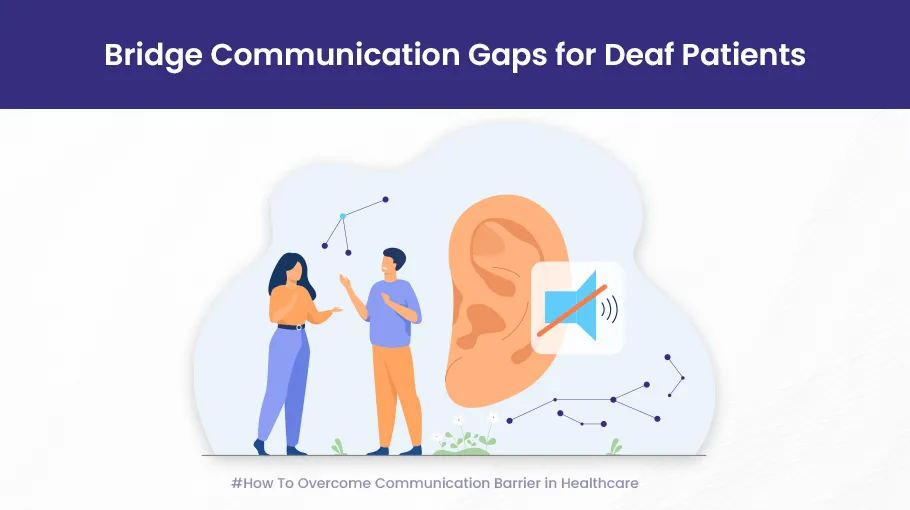
3. Bridge Communication Gaps for Deaf Patients
Patients with hearing disabilities may face emotional communication barriers in healthcare settings. These challenges can include difficulties in following verbal instructions, participating in consultations. The patients cannot fully understand medical information, leading to misunderstandings about treatment plans.
Now the solution? Well, healthcare providers should offer different communication aids, including sign language interpreters, text telephones (TTYs), and captioned videos. Ensure that all staff are trained to use these aids effectively and to communicate in ways that accommodate hearing disabilities.
Also, ensure that communication is clear and that patients understand their care instructions. Using teach-back techniques can help confirm that patients have correctly understood the information provided. Remember that the Americans with Disabilities Act requires that effective communication be provided at no cost to patients.
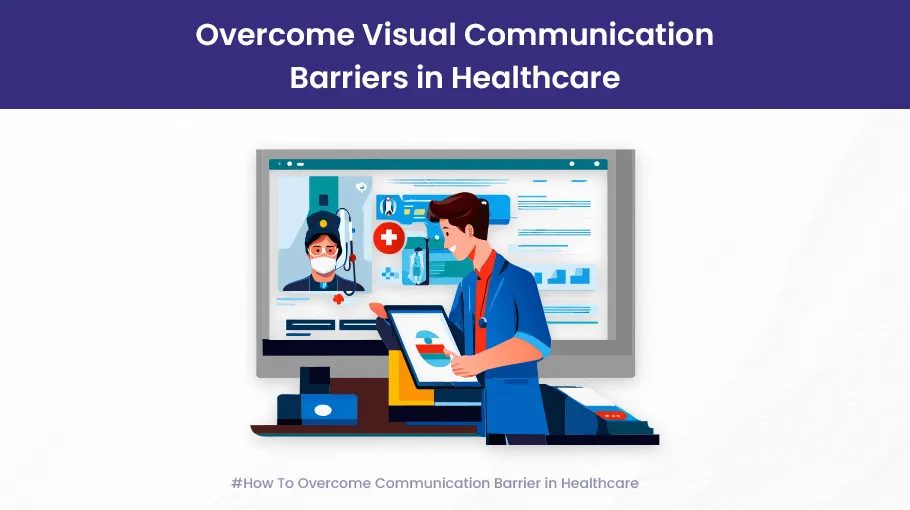
4. Overcome Visual Communication Barriers in Healthcare
Patients with visual impairments may have communication difficulties in healthcare settings. For example, they struggle to access and understand printed materials, visual aids, or written instructions. This can create barriers to understanding medical information and following treatment plans.
To address these difficulties, healthcare providers should offer accessible communication formats such as large-print materials, audio recordings, and screen reader software. Other examples of visual communication in healthcare settings include screen magnifiers and Braille materials to enhance accessibility.
Healthcare professionals should also inquire about each patient’s specific needs and preferences regarding accessible communication. By accommodating these needs and ensuring that information is presented in a way that suits the patient’s abilities, providers can improve patient comprehension and satisfaction.
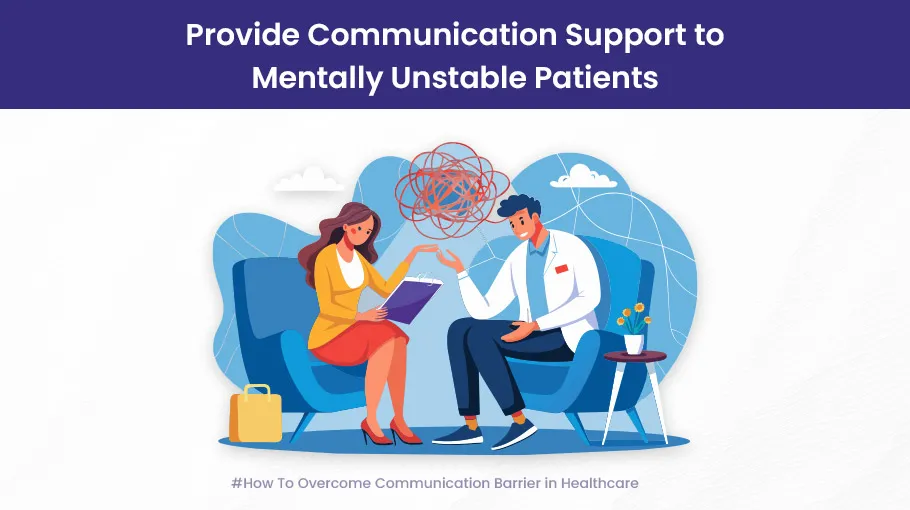
5. Provide Communication Support to Mentally Unstable Patients
Mental health conditions can significantly impact a patient’s ability to communicate effectively in healthcare settings. Conditions such as depression, anxiety, and severe psychological distress can interfere with concentration, memory, and emotional responses. It becomes challenging for patients to engage in clear communication.
Healthcare providers should provide a supportive and non-judgmental environment, breaking down information into manageable segments. You can also use clear language and regularly check for understanding.
Also, integrate mental health support into the care process to help address communication barriers. For example, collaborating with mental health professionals to address underlying issues and providing resources for emotional support can improve the patient’s ability to communicate effectively.
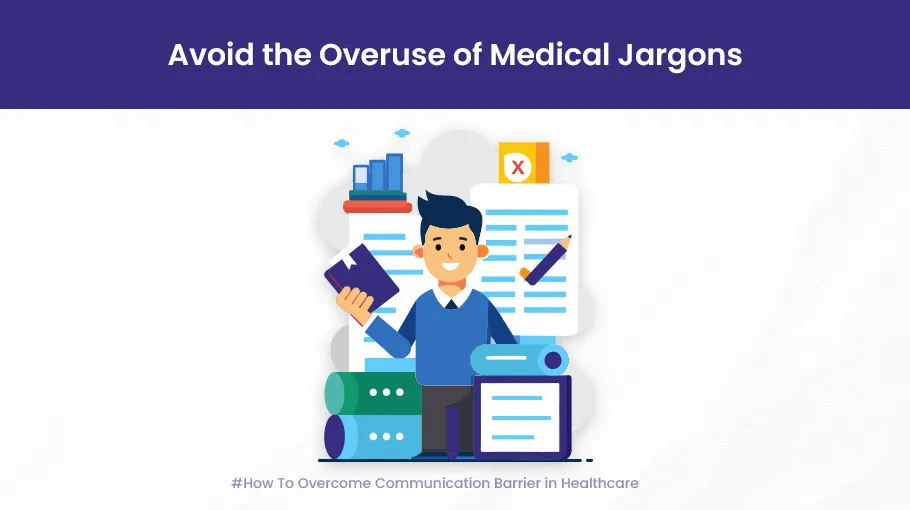
6. Avoid the Overuse of Medical Jargons
Differences in communication skills and styles between healthcare providers and patients can lead to misunderstandings. For example, the use of complex medical jargon can confuse patients who are not familiar with these terms. Or some patients might need more detailed explanations than others.
Healthcare providers should adapt their communication styles to meet the needs of individual patients. You can use plain language, avoid complex medical jargon, and tailor explanations to match the patient’s level of understanding. You should also engage in active listening to better understand the patient’s communication level.
Also, employ decision aids and visual tools to clarify complex information and ensure that patients grasp key concepts. Leverage effective communication strategies, including how to recognize and address differences in communication styles, can further enhance patient-provider interactions.
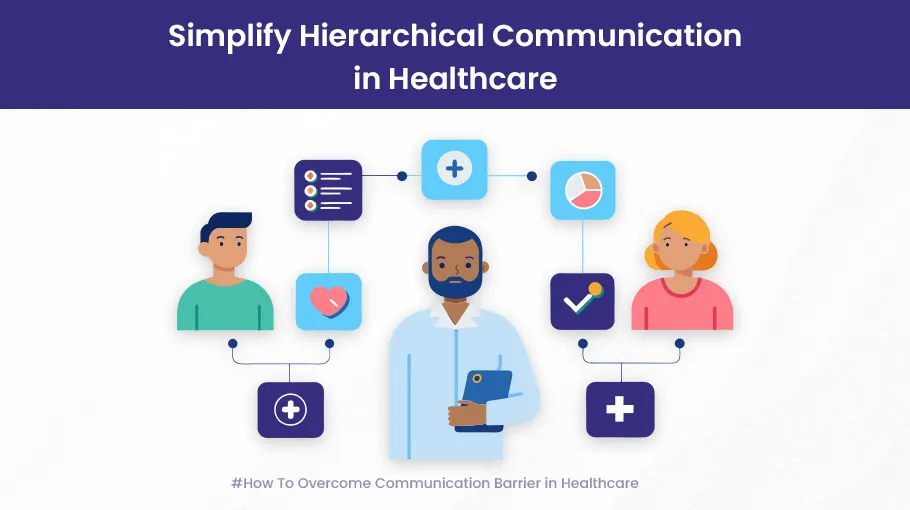
7. Simplify Hierarchical Communication in Healthcare
Complex or rigid organizational structures within healthcare settings can create barriers to effective communication. Hierarchical systems and bureaucratic processes may lead to information silos, delays in communication, and a lack of coordination between different departments or care teams.
Healthcare organizations should streamline communication processes and promote a culture of collaboration. For example, you can integrate communication systems that facilitate information sharing and ensure that all team members are on the same page. And you can also encourage interdisciplinary teamwork and regular meetings.
Simplifying organizational structures and improving workflow efficiency can minimize hierarchical communication barriers in healthcare. Healthcare organizations with flexible and responsive communication can better support patient care and ensure that information flows smoothly across all levels of the organization.
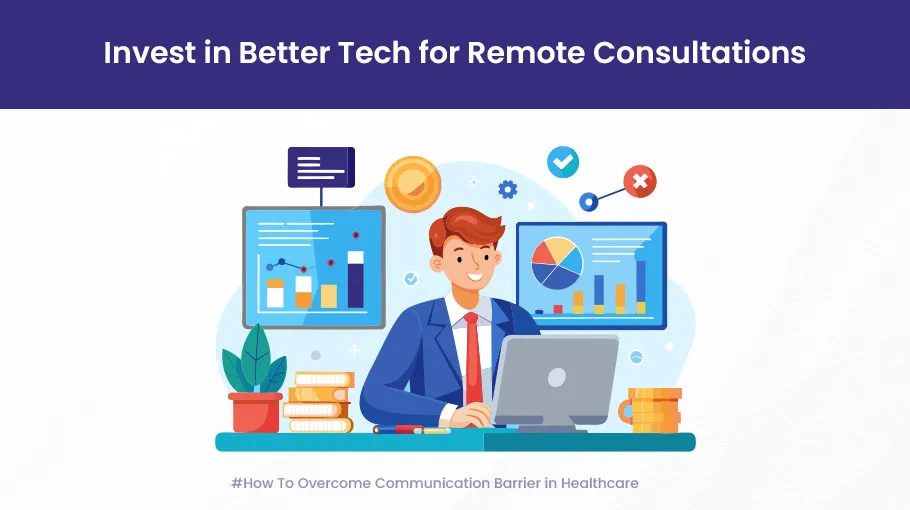
8. Invest in Better Tech for Remote Consultations
Socially distanced consultations, while necessary in some situations, can create barriers to effective communication in healthcare. Issues such as poor video or audio quality, lack of personal interaction, and technical difficulties can hinder the clarity and effectiveness of remote healthcare interactions.
The solution? Healthcare providers should invest in reliable technology and ensure that all the parties involved know how to use it. Offer training on telemedicine platforms and provide technical support to address issues related to remote consultations. Also, create a personal connection with patients, even in a virtual setting, to forge trust.
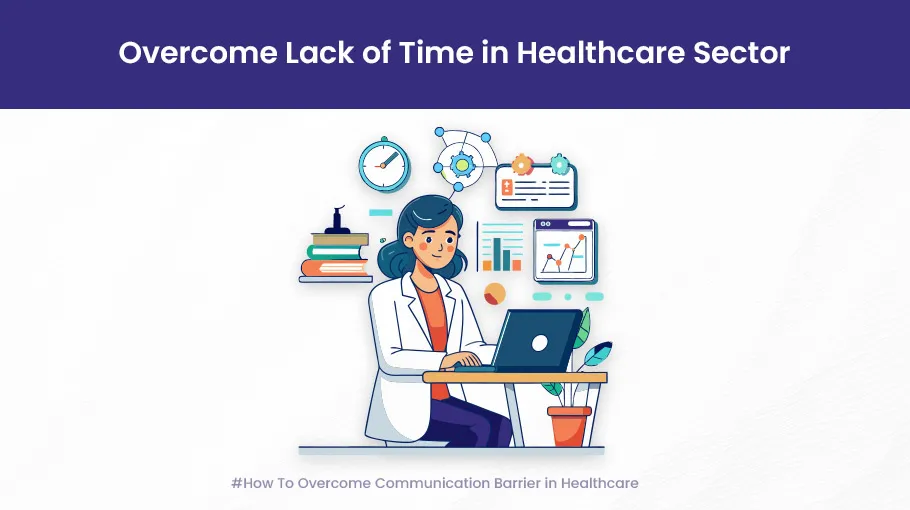
9. Overcome Lack of Time in Healthcare Sector
Limited time during consultations can prevent thorough communication between patients and providers. It can also minimize the chance of thorough examination, diagnosis, and shared decision making between the provider and the patient. And it leads to poor care quality and less-favorable health outcomes.
Effective time management is extremely important for healthcare providers. It improves patient care, increases efficiency, reduces stress, and brings in more revenue. But it can be challenging in healthcare due to the unpredictable workload, tons of administrative tasks, and other factors.
The solution? Healthcare organizations should train staff on planning, time management, work efficiency, and create compensation and benefits plans for providers. Healthcare providers should also prioritize patient care and spend ample time for diagnosis, consultation, and treatment.
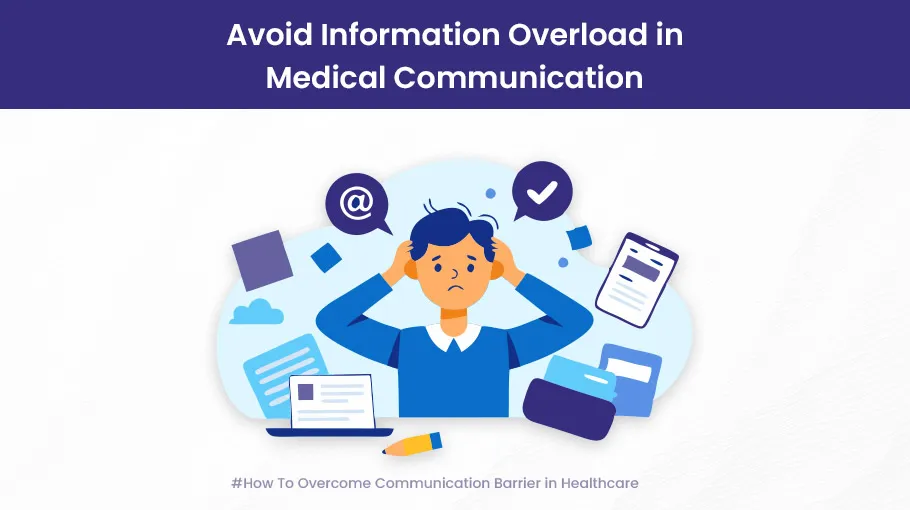
10. Avoid Information Overload in Medical Communication
Information overload in the healthcare setting occurs when patients are bombarded with excessive or complex information. This can result in patients missing key details about their diagnosis, treatment options, or care instructions.
To combat information overload, healthcare providers should deliver information in clear, concise, and manageable segments. Also, utilize visual aids, summaries, and decision aids to help patients better understand and retain critical information. Also, be prepared to revisit or clarify details as needed.
You can also offer written materials in various formats and ensure that patients have access to follow-up resources, minimizing the effects of information overload. Providers can overcome communication barriers in healthcare by presenting information tailored to the patient’s needs and capacity.
FAQs
What do barriers to effective communication in healthcare do?
Barriers to effective communication in healthcare can negatively impact patient care. When doctors and patients can’t understand each other well, important health information can get lost or misinterpreted. This can lead to improper diagnosis, inadequate treatment, and poor health outcomes.
How does a language barrier affect communication in healthcare?
A language barrier is one of the biggest obstacles to good communication in healthcare. If a patient and doctor don’t speak the same language fluently, they will struggle to discuss the patient’s symptoms, medical history, and treatment options accurately. This can be frustrating for both parties and compromise the quality of care. For example, a Spanish-speaking patient may not fully grasp a doctor’s instructions about medication dosage or post-operative care if they have to communicate through an interpreter.
Can you explain a barrier in communication in healthcare with a short example?
Let’s say a patient tells her doctor she’s been feeling “nerviosa” lately. The doctor assumes this means the patient has been feeling nervous or anxious. However, in the patient’s culture, “nervios” refers to a range of physical symptoms, not just an emotional state. Due to this misunderstanding, the doctor prescribes anti-anxiety medication, when what the patient really needs is treatment for somatic symptoms. This miscommunication could have been avoided if the doctor had asked clarifying questions and not assumed the meaning of the patient’s words.
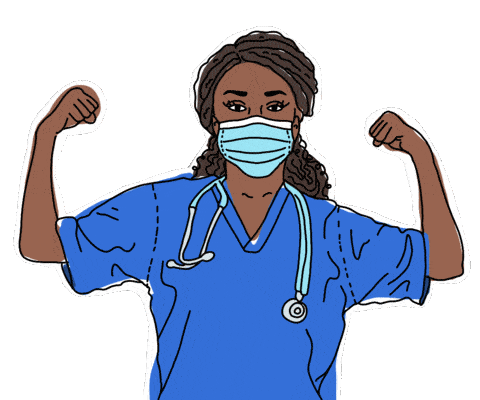
Outsource Medical Billing To Strengthen Doctor-Patient Relationships
BellMedEx Medical Billing Service simplifies patient and doctor billing. We explain prices and insurance and answer all your queries. This lets clinicians focus on patient care rather than billing. Leave the bills to BellMedEx, so you can focus on getting to know your patients.
